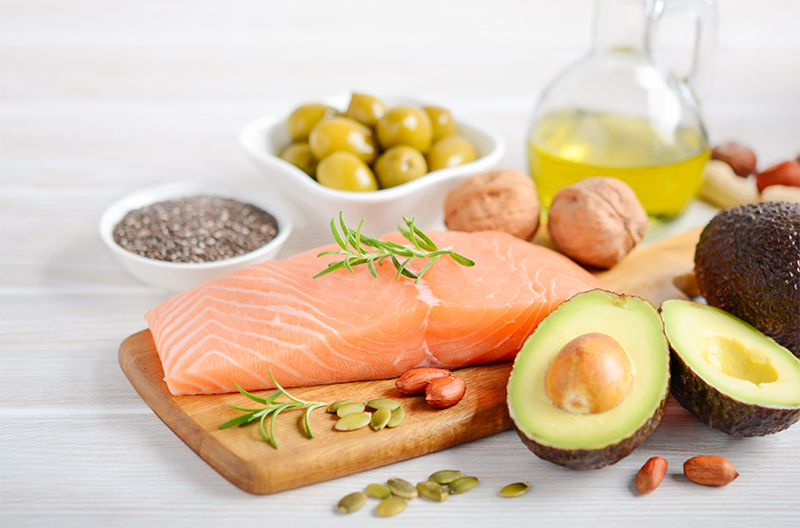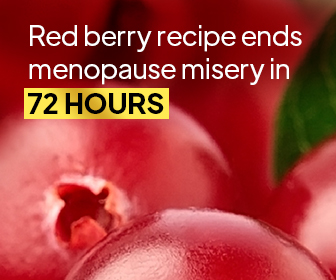Believe it or not, “fat” doesn’t have to be a dirty word. If you’re on the Ketogenic diet, between 55 and 60% of your micronutrient intake will be fats.[1] Choosing the right fat sources will help you stay healthy. Within this guide, you’ll learn about healthy fats for Keto dieters and how you can eat a nutritionally-balanced diet.
What is Fat Exactly?
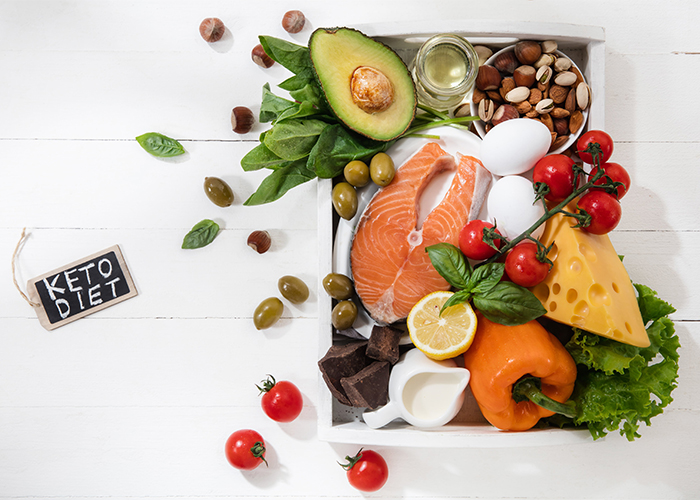
Before we take a look at the healthy fats for Keto dieters, you need to understand the basics. According to the American Heart Association, dietary fats are necessary for energy and cell growth in your body.[2] They’re also useful for helping your body to absorb certain nutrients and produce essential hormones on a regular basis.[3]
Put simply, you need to include fat in your daily diet. Cutting them out completely would be very detrimental to your overall health. However, when it comes to fats, it’s all about choosing the right ones for your body.
If you’re following the Keto diet, that means understanding the Keto healthy fats list in-depth and using it to your advantage. Luckily, you’ve come to the right place. In this guide, we’ll shed light on the best fat sources.
What Should I Look for When Selecting Healthy Fats on Keto?
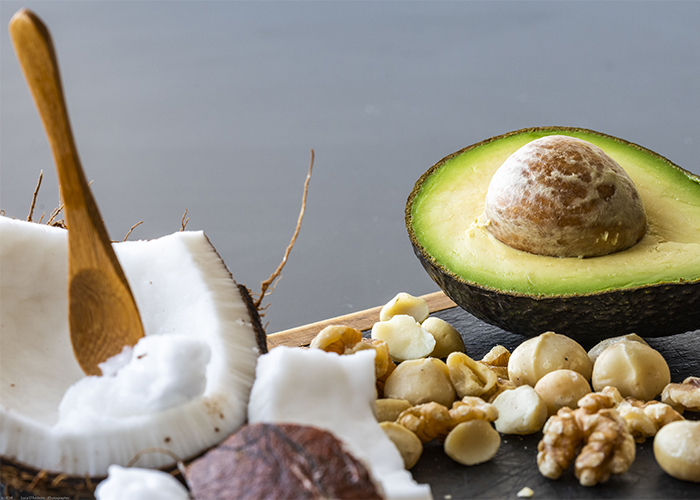
Since the typical Keto diet plan consists heavily of fats, choosing to eat the right ones is essential to your overall health. According to information from Harvard T. H. Chan, there are two types of “good” unsaturated fats.[4] These are known as monounsaturated fats and polyunsaturated fats and are primarily found in foods that are derived from plants.
- Monounsaturated fats
Monounsaturated fats can actually help to reduce the amount of bad cholesterol in your blood, according to the American Heart Association.[5] For that reason, choosing to eat them rather than saturated fats is a smart way to protect your overall health.
These fats are often found in plant-based food sources such as avocado, olive oil, nuts, and seeds.[6] - Polyunsaturated fats
Polyunsaturated fats can also reduce harmful cholesterol in your blood and decrease your risk of heart attack or stroke, according to the American Heart Association.[7] That means, when consumed in moderation, these fats may help to support your heart health.
Sources of polyunsaturated fats include flaxseed, walnuts, fish, and soybeans among other foods.[8]
Pro Tip: Naturally occurring fats — such as those found in avocados —are more likely to have a positive effect on your health. When choosing healthy fats for the Keto diet, it’s worth keeping this in mind!
Which Fats Should I Avoid?

Before we look at some of the healthy fats for Keto diet followers, let’s look at the fats that you should be avoiding. You should take note of these particularly if you’re new to the diet.
Putting your health and wellness first means identifying the foods that will likely cause you harm and cutting them out of your diet. Here are some of the fats that you should steer clear of when you’re creating your everyday meal plan:
1. All trans fats

Originally only found in margarines and vegetable shortenings, trans fats have since become common in a range of food. Processed snacks, such as commercial cookies and pastries, often contain trans fats.
So, how bad are these fats for you? To understand that, you should first delve into what they are and how they’re produced.
A process called hydrogenation, in which healthy fats and oils become solid, creates these fats.[9] According to a report from Harvard Health, there’s no “safe” amount of trans fats that a person can consume. Having any amount of these fats in your diet could increase the amount of dangerous LDL cholesterol in your bloodstream.[10] There’s a direct link between consuming trans fats and a higher risk of heart disease, stroke, and diabetes.[11]
For that reason, anybody trying to lead a healthy lifestyle should avoid these fats entirely. Luckily, these fats are officially banned in the USA. However, it’s still worth checking the labels of the food items that you buy while abroad to ensure you don’t consume any.
2. Some saturated fats
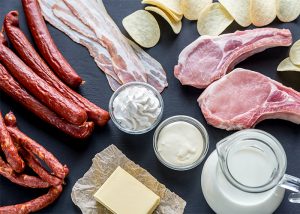
The issue of saturated fats is always a hot topic. Food items containing saturated fats are usually solid at room temperature.[12] For example, meat fats, butter, cheese, and other dairy products all contain these types of fats. There’s a lot of controversy surrounding whether these saturated fats can be included as part of a healthy Keto diet menu plan.
Traditionally, experts believed that these fats were harmful to a person’s health and could have a link to an increased risk of heart disease. Despite this fact, recent studies into the issue have confused the matter by returning no strong evidence to support the supposed link.[13]’[14]’[15] However, despite the recent lack of evidence, it pays to be wary of these fats in general.
With that in mind, the American Heart Association advises that people should gain just 5% to 6% of their daily caloric intake from saturated fat sources.[16] To put that into perspective, that means that the average person should have just 13g of saturated fats per day. Ensuring that your intake of these fats is as low as possible could be a smart move.
The Ultimate Keto Healthy Fats List
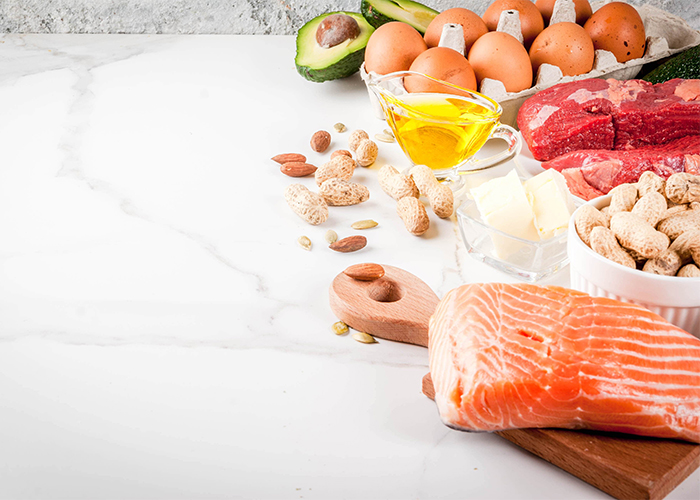
Want to maintain peak health while you’re following the Keto weight loss program? As we’ve already covered, the Ketogenic diet is a high-fat plan. While your intake may differ on variations of the plan, such as the cyclical Ketogenic diet, eating healthful fats is key.
Finding healthy fats for Keto diet followers doesn’t have to be a struggle. To get you started on your journey, let’s take a look at the ultimate Keto healthy fats list:
1. Coconut oil
When you’re on the hunt for healthy fats for the Keto diet, coconut oil is a great place to start. You can use this oil in your cooking as a substitute for other oils and even butter.
Research published in the Applied Physiology, Nutrition, and Metabolism journal suggests that coconut oil can lower blood pressure and prevent weight gain, when paired with exercise.[17] However, this oil is high in saturated fat, which means you don’t want to consume too much of it.[18] Be sure to use it sparingly.
2. Avocados
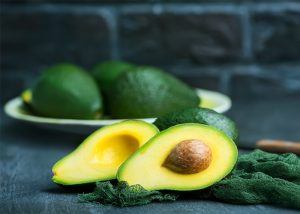
There’s no doubt about it, avocados are highly versatile fruit. You can mash them and eat them on toast or create a guacamole using them.
High in monounsaturated fats, these fruits also have a wealth of health benefits. Research from the American Heart Association suggests that consuming them on a daily basis can lower your risk of heart disease.[19]
3. Nuts and seeds
Both nuts and seeds are excellent sources of healthy fats for Keto dieters. For example, almonds, hazelnuts, pecans, pumpkin seeds, and sesame seeds are all sources of monounsaturated fats.[20] What’s more, sunflower seeds, walnuts, and flaxseed are sources of polyunsaturated fats.[21]
Using these ingredients as a part of your diet will offer you healthy fats while also allowing you to vary your meals. Simple.
4. Fish
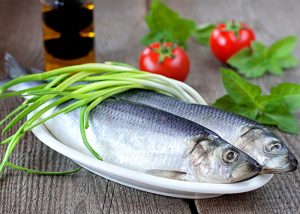
Fancy a grilled fillet of salmon? You’re in luck. Fish is a fantastic source of healthy fats for Keto followers. Opt for a variety of fish such as herring, mackerel, salmon, trout, and tuna as these offer polyunsaturated fats.[22]
Grilling these ingredients rather than frying them means they’ll be better for your health. Try to vary your diet and include a range of fish.
5. Lean or grass-fed meat
Needless to say, the standard Keto diet is high in meat. However, choosing the right type of meat for your diet will support your health goals. Eating too much red meat could increase your risk of heart disease.[23] With that in mind, you’ll need to limit how much you consume.
Choosing grass-fed beef over grain-fed beef is also a clever move. The former is more nutritionally-balanced and has lower levels of monounsaturated fat, according to research.[24] For that reason, it could be the way to go.
6. Chicken and turkey
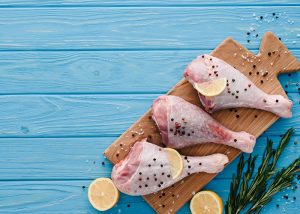
Since your meal plan is meat-heavy, opting for lean cuts of meat is vital. Chicken and turkey tend to be leaner than red meat and also have less saturated fat, according to the American Heart Association.[25]
Including these meats in your diet plan will help you get protein and healthy fat while also satisfying your hunger pangs along the way.
7. Olives and olive oil
Both olives and olive oil are excellent sources of monounsaturated fats.[26] Including these ingredients in your Keto healthy fats list is a no-brainer. You can eat olives as a healthy and oh-so-satisfying snack, for instance. You can also use olive oil to cook or as an ingredient in Keto-friendly meals.
However, you should be aware that frying edible oils could produce trans fats, according to research from the Food Chemistry Journal.[27] And many canned varieties of olives are overly high in sodium, so be sure to check the labels!
Ready to Get Friendly with Fats?
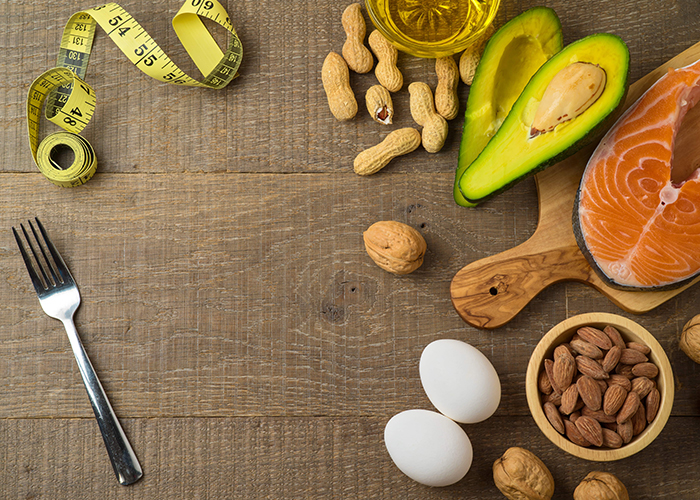
Fats are a core part of the Keto diet. By using this guide, you can ensure that you eat the right types of fat to give your body the nutrients it needs.
Use this guide as a starting point and be sure to tailor your meal plan to suit your individual dietary needs.
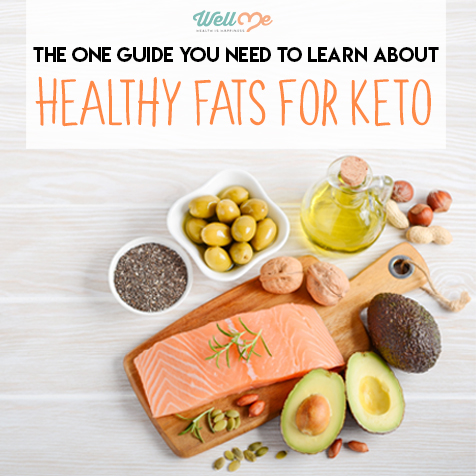
References
- [1] https://www.ncbi.nlm.nih.gov/books/NBK499830
- [2] https://www.heart.org/en/healthy-living/healthy-eating/eat-smart/fats/dietary-fats
- [3] https://www.heart.org/en/healthy-living/healthy-eating/eat-smart/fats/dietary-fats
- [4] https://www.hsph.harvard.edu/nutritionsource/what-should-you-eat/fats-and-cholesterol/types-of-fat
- [5] https://www.heart.org/en/healthy-living/healthy-eating/eat-smart/fats/monounsaturated-fats
- [6] https://www.hsph.harvard.edu/nutritionsource/what-should-you-eat/fats-and-cholesterol/types-of-fat
- [7] https://www.heart.org/en/healthy-living/healthy-eating/eat-smart/fats/polyunsaturated-fats
- [8] https://www.hsph.harvard.edu/nutritionsource/what-should-you-eat/fats-and-cholesterol/types-of-fat
- [9] https://www.health.harvard.edu/staying-healthy/the-truth-about-fats-bad-and-good
- [10] https://www.health.harvard.edu/staying-healthy/the-truth-about-fats-bad-and-good
- [11] https://www.health.harvard.edu/staying-healthy/the-truth-about-fats-bad-and-good
- [12] https://www.heart.org/en/healthy-living/healthy-eating/eat-smart/fats/saturated-fats
- [13] https://openheart.bmj.com/content/3/2/e000409.long
- [14] https://www.ncbi.nlm.nih.gov/pmc/articles/PMC5437600
- [15] https://www.ncbi.nlm.nih.gov/pubmed/24723079
- [16] https://www.heart.org/en/healthy-living/healthy-eating/eat-smart/fats/saturated-fats
- [17] https://www.nrcresearchpress.com/doi/10.1139/apnm-2014-0351#.XWfFKy2ZOfQ
- [18] https://fdc.nal.usda.gov/fdc-app.html#/?query=ndbNumber:4047
- [19] https://www.ahajournals.org/doi/10.1161/JAHA.114.001355
- [20] https://www.hsph.harvard.edu/nutritionsource/what-should-you-eat/fats-and-cholesterol/types-of-fat
- [21] https://www.hsph.harvard.edu/nutritionsource/what-should-you-eat/fats-and-cholesterol/types-of-fat/
- [22] https://www.accessdata.fda.gov/scripts/InteractiveNutritionFactsLabel/factsheets/Monounsaturated_and_Polyunsaturated_Fat.pdf
- [23] https://www.nih.gov/news-events/nih-research-matters/eating-red-meat-daily-triples-heart-disease-related-chemical
- [24] https://www.ncbi.nlm.nih.gov/pubmed/24018274
- [25] https://www.heart.org/en/healthy-living/healthy-eating/eat-smart/nutrition-basics/meat-poultry-and-fish-picking-healthy-proteins
- [26] https://www.accessdata.fda.gov/scripts/InteractiveNutritionFactsLabel/factsheets/Monounsaturated_and_Polyunsaturated_Fat.pdf
- [27] https://www.sciencedirect.com/science/article/pii/S0308814610006084?via%3Dihub

